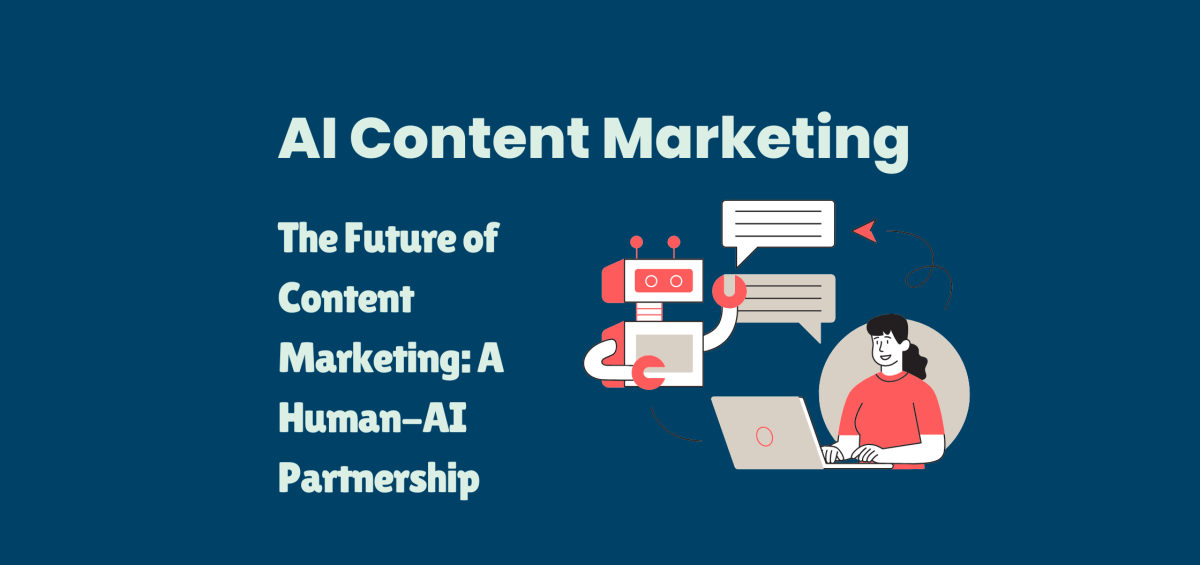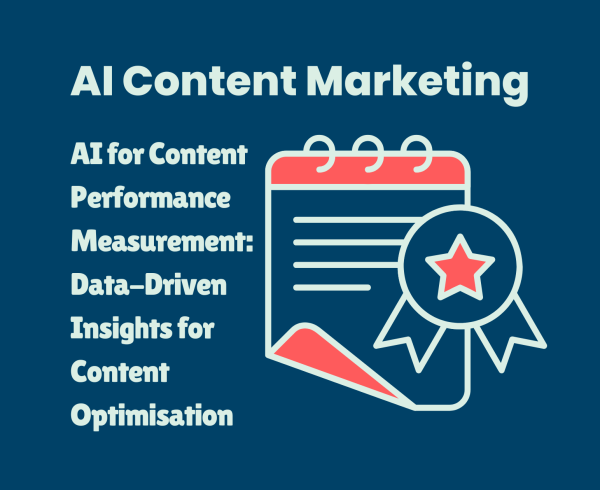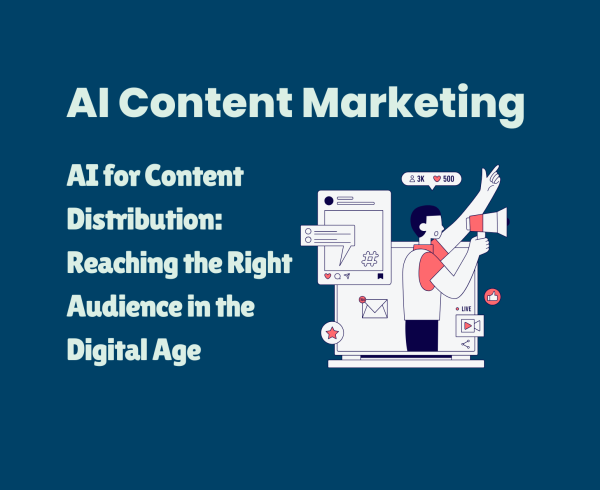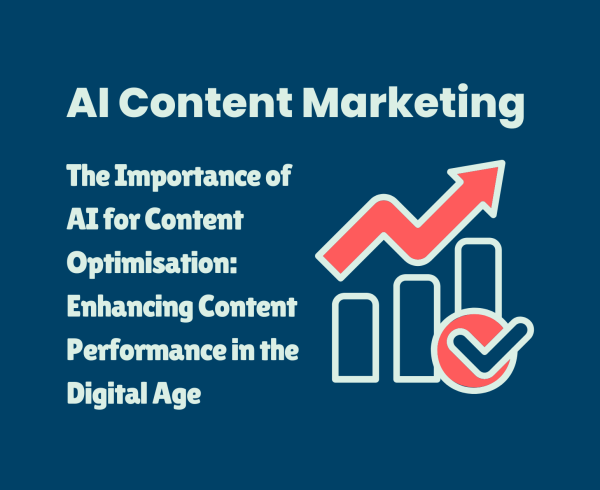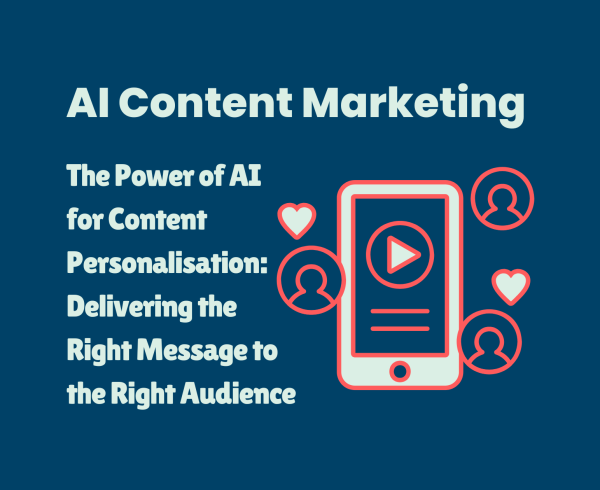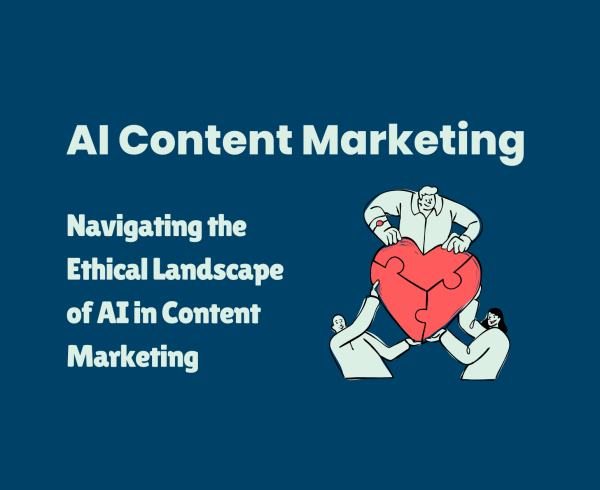Artificial intelligence (AI) is rapidly changing the landscape of content marketing, offering exciting possibilities for innovation and growth. As AI technology continues to evolve, it’s poised to revolutionize how we create, consume, and distribute content. This article explores the future of content marketing in the age of AI, highlighting the key trends, opportunities, and challenges that lie ahead.
- The Future of Content Creation: Human + Machine
AI is already automating many aspects of content creation, from generating product descriptions to writing news reports. In the future, AI will play an even greater role in content creation, assisting human writers with research, ideation, and even drafting entire articles. This human-AI collaboration will unlock new levels of creativity and efficiency, allowing marketers to produce high-quality content at scale.
- AI-Powered Writing Assistants: AI writing tools will become more sophisticated, capable of generating different types of content, including blog posts, articles, social media updates, and even scripts. These tools will assist human writers with research, ideation, and drafting, freeing up time for higher-level tasks like strategy and creativity.
- AI-Generated Content: AI will be used to generate certain types of content entirely, such as product descriptions, news reports, and summaries of data-driven information. This will allow human writers to focus on more complex and creative content that requires human expertise and judgment.
- Personalized Content Creation: AI will enable the creation of hyper-personalized content experiences, tailoring content to individual needs and preferences in real-time. This will require AI systems that can understand user intent, context, and preferences, and generate content that is relevant and engaging.
- The Future of Content Consumption: Personalized and Immersive
AI will transform how people consume content, providing personalized recommendations and creating new immersive experiences. AI-powered recommendation engines will analyze user data to suggest content that is relevant to their interests and preferences, making content discovery more efficient and enjoyable. AI will also enable the creation of new content formats, such as interactive videos and personalized stories, providing users with more engaging and immersive experiences.
- AI-Powered Content Recommendations: AI will personalize content recommendations across various platforms, including websites, social media, and streaming services. This will ensure that users see content that is relevant to their interests, improving user satisfaction and engagement.
- Interactive Content Experiences: AI will enable the creation of interactive content experiences, such as quizzes, polls, and games, that allow users to actively participate and engage with the content. This will make content consumption more interactive and enjoyable.
- Immersive Content Formats: AI will power new immersive content formats, such as virtual reality (VR) and augmented reality (AR) experiences, that provide users with a more engaging and realistic content experience. This will open up new possibilities for storytelling and brand engagement.
- The Future of Content Distribution: AI-Driven Optimization
AI will optimize content distribution across various channels, ensuring that content reaches the right audience at the right time. AI-powered tools will analyze user data and content performance to identify the optimal channels and times to distribute content, maximizing reach and engagement. AI will also automate the distribution process, making it easier for marketers to share their content with a wider audience.
- AI-Powered Content Optimization: AI will optimize content for different channels and platforms, ensuring that content is formatted and delivered in a way that maximizes reach and engagement. This will include optimizing content for search engines, social media, email, and other channels.
- Automated Content Distribution: AI will automate the content distribution process, making it easier for marketers to share their content across various channels and platforms. This will include scheduling social media posts, sending email newsletters, and managing content syndication.
- Personalized Content Delivery: AI will personalize content delivery, ensuring that users receive content that is relevant to their interests and preferences. This will include delivering personalized content recommendations, targeted email campaigns, and dynamic website content.
- The Impact of AI on Content Marketing Jobs
The rise of AI in content marketing will inevitably impact the job market, but it’s unlikely to completely replace human content marketers. Instead, AI will augment human capabilities, allowing marketers to focus on higher-level tasks that require creativity, strategy, and emotional intelligence. This will require content marketers to adapt their skills and embrace AI as a collaborative tool.
- New Job Roles: AI will create new job roles in content marketing, such as AI content strategists, AI content creators, and AI content analysts. These roles will require a combination of content marketing expertise and AI knowledge.
- Upskilling and Reskilling: Content marketers will need to upskill and reskill to adapt to the changing landscape of AI in content marketing. This will include learning how to use AI tools, understanding AI ethics, and developing new skills in areas like data analysis and personalization.
- Human-AI Collaboration: The future of content marketing will be one of human-AI collaboration, where humans and machines work together to create and deliver exceptional content experiences. This will require content marketers to embrace AI as a collaborative tool and develop new ways of working with AI.
- AI and the Metaverse: The Next Frontier of Content
The metaverse, a virtual world where users can interact with each other and digital objects, presents a new frontier for content marketing. AI will play a crucial role in creating and delivering content experiences in the metaverse, enabling personalized and immersive experiences that engage users on a deeper level.
- AI-Powered Avatars and Virtual Assistants: AI will power avatars and virtual assistants in the metaverse, providing users with personalized guidance and support. This will enhance the user experience and make the metaverse more accessible and engaging.
- AI-Generated Content in the Metaverse: AI will generate content in the metaverse, creating dynamic and interactive experiences that respond to user actions and preferences. This will allow for personalized and immersive storytelling and brand experiences.
- AI-Driven Content Distribution in the Metaverse: AI will optimize content distribution in the metaverse, ensuring that users discover and engage with relevant content. This will include personalized content recommendations, targeted advertising, and social media integration.
- AI and Web3: Decentralized Content Creation
Web3, the decentralized web, offers new possibilities for content creation and ownership. AI will play a role in facilitating decentralized content creation, enabling creators to collaborate and share their work in new ways. AI will also help ensure the authenticity and provenance of content in the Web3 environment.
- AI-Powered Content Collaboration: AI will facilitate content collaboration in the Web3 environment, enabling creators to connect and work together on projects. This will foster creativity and innovation in content creation.
- AI-Generated Content in Web3: AI will generate content in the Web3 environment, creating new forms of art and expression. This will expand the possibilities of content creation and provide new opportunities for creators.
- AI-Driven Content Verification: AI will help verify the authenticity and provenance of content in the Web3 environment, ensuring that creators are properly credited and compensated for their work. This will protect creators’ rights and promote fair compensation.
- AI and the Creator Economy: Empowering Content Creators
The creator economy, where individuals create and monetize their own content, is booming. AI will empower content creators with new tools and technologies to create, distribute, and monetize their work more effectively. This will democratize content creation and provide new opportunities for individuals to build their own businesses.
- AI-Powered Content Creation Tools: AI will provide creators with powerful content creation tools, making it easier to create high-quality content in various formats. This will lower the barrier to entry for content creation and allow more people to participate in the creator economy.
- AI-Driven Content Monetization: AI will help creators monetize their content more effectively, identifying new revenue streams and optimizing monetization strategies. This will allow creators to earn a living from their work and build sustainable businesses.
- AI-Powered Content Analytics: AI will provide creators with detailed content analytics, helping them understand their audience and optimize their content for better performance. This will allow creators to make data-driven decisions and improve their content strategy.
- AI and Content Marketing Education: Preparing for the Future
As AI transforms content marketing, education and training will be crucial to prepare the next generation of content marketers. Educational institutions and industry organizations will need to adapt their curricula and programs to incorporate AI knowledge and skills, ensuring that content marketers are equipped for the future of the profession.
- AI in Content Marketing Courses: Educational institutions will need to incorporate AI into their content marketing courses, teaching students about AI tools, techniques, and ethical considerations. This will ensure that graduates are prepared for the AI-powered content marketing landscape.
- AI Content Marketing Certifications: Industry organizations will need to develop AI content marketing certifications to validate the skills and knowledge of content marketers in the AI domain. This will help employers identify qualified candidates and ensure that content marketers have the necessary expertise.
- AI Content Marketing Training Programs: Companies and organizations will need to provide AI content marketing training programs to upskill their existing workforce and prepare them for the changing demands of the profession. This will ensure that content marketers can effectively leverage AI in their work.
- AI and Content Marketing Regulation: The Legal Landscape
The use of AI in content marketing raises legal and regulatory questions that will need to be addressed. Governments and regulatory bodies will need to develop frameworks and guidelines to ensure the responsible and ethical use of AI in content marketing, protecting consumers and promoting fair competition.
- Data Privacy and Security: Regulations will need to address data privacy and security concerns related to the use of AI in content marketing, ensuring that user data is collected, used, and protected responsibly.
- Bias and Discrimination: Regulations will need to address the potential for AI bias and discrimination in content marketing, ensuring that AI systems are fair and inclusive.
- Transparency and Explainability: Regulations will need to promote transparency and explainability in AI systems used for content marketing, allowing users to understand how AI is being used and its potential impact on the content they consume.
- The Future of AI and Content Marketing: Predictions and Opportunities
The future of AI and content marketing is full of possibilities. AI will continue to transform the field, creating new opportunities for innovation, growth, and engagement. Here are some predictions and opportunities for the future of AI in content marketing:
- Hyper-personalization: AI will enable even more granular personalization of content experiences, tailoring content to individual needs and preferences in real-time.
- AI-powered content creation: AI will play an even greater role in content creation, generating high-quality content in various formats, including text, images, and videos.
- Predictive analytics: AI will be used to predict content performance, identify trends, and optimize content strategies for maximum impact.
- Human-AI collaboration: The future of content marketing will be one of human-AI collaboration, where humans and machines work together to create and deliver exceptional content experiences.
- AI and the metaverse: AI will play a crucial role in creating and delivering content experiences in the metaverse, enabling personalized and immersive experiences that engage users on a deeper level.
- AI and Web3: AI will facilitate decentralized content creation, enabling creators to collaborate and share their work in new ways.
- AI and the creator economy: AI will empower content creators with new tools and technologies to create, distribute, and monetize their work more effectively.
Conclusion
The future of content marketing is inextricably linked to the development and adoption of AI. AI will transform how we create, consume, and distribute content, offering exciting possibilities for innovation and growth. By embracing AI as a collaborative tool and navigating the ethical and regulatory landscape responsibly, content marketers can harness the power of AI to create more personalized, engaging, and effective content experiences. The future of content marketing is human-AI, and it’s a future full of promise and potential.

